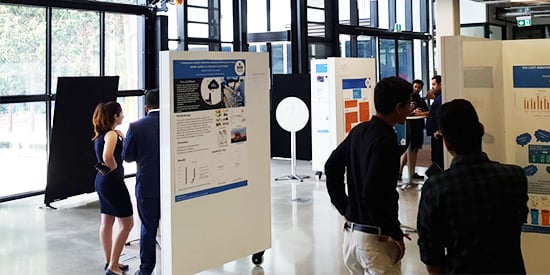Student projects in the spotlight at Deakin engineering expo
Deakin news
The creativity and expertise of Deakin University engineering students was on display at the T3 Engineering Project Expo in February.
Around 30 undergraduate and 40 masters engineering students presented their capstone projects at the expo, which was hosted by the School of Engineering at Deakin’s Centre for Advanced Design in Engineering Training (CADET).
A broad variety of engineering disciplines were represented, with projects ranging from testing aluminium formwork and a data logging system for a wastewater evaporation company, to a closed-loop neural system for the control of refractory epilepsy.
Dr Ellen Moon, lecturer in environmental engineering at Deakin, is the unit chair for the undergraduate project units. She says engineering undergraduate and masters by coursework students undertake a large project as part of their studies, and presenting their work at the expo is one of the project assessment tasks.
‘The idea is that students showcase the research projects they’ve been doing over the past two trimesters, in a way that is easy to digest and visually appealing,’ Dr Moon explains.
Students prepare a poster to communicate their research, as well as a two to five minute explanation of their project and what the main outcomes were.
‘The expo is set up in an exhibition-like format, making use of the ground floor of CADET, where we’ve got all of those wonderful open spaces,’ Dr Moon says.
‘We invite our academic staff members to come around to assess the students, but also to engage with them and find out about the kind of research that is happening here across the different disciplines.
‘We’re not always familiar with the research that happens outside of our own research group or our own particular area of engineering, and of course there’s such a breadth of topics covered in this school, so the expo is a great way of showcasing that.’
Dr Moon says the expo is a good way for students to practise their presentation skills.
‘A big focus of the way our engineering assessments are run is to try and make them as realistic and as real life as possible,’ she says.
‘Every professional engineer – whether they end up in academia or in industry – at some point is going to have to take part in a conference or an exhibition where they’re either promoting their research or a product or expertise.
‘So it’s that practice of demonstrating their work in a way that’s visually appealing, being able to verbally communicate it in a concise manner, and also thinking about how to create a display that is attractive, so people will walk past and be drawn to it and want to come over and talk to them about what they’ve done.’
Some students worked with industry partners on their project, which Dr Moon says provides them with valuable experience.
‘It teaches students important things about intellectual property, about timelines with industry projects as well, because from the course perspective, yes, the project timeline is very fixed, but there’s no guarantee that your industry partner’s commitment and timelines will necessarily match up with that.
‘It teaches them they have to be very organised and very proactive about seeking the information or the equipment they need.
‘So I do think there’s an awful lot to be learned through these industry collaborative projects and we encourage students to undertake them when they have the chance to.’
The School of Engineering hosts a Project Expo at the end of every trimester, with the largest at the end of Trimester 2, with over 250 students presenting and industry invited to attend.
Find out more about studying engineering at Deakin.
Share this story

